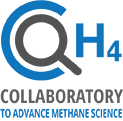First CAMS Award to Develop Open Access Oil and Gas Operations Emission Calculator
University of Texas-Austin Wins Project from New Methane Science Consortium
2/13/19 Des Plaines, IL
The Collaboratory for Advancing Methane Science (CAMS) has awarded its first research project to the University of Texas-Austin to study spatial and temporal methane emissions profiles across various oil and gas basins and develop a publicly available tool to model emissions inventories from oil and gas production.
University of Texas-Austin, in collaboration with Colorado State University and SLR Consulting, will develop libraries of emissions data sets and activity factors. The model will have the flexibility to select custom emissions and activity factors from these libraries or utilize data provided by the user. The tool will then allow users to simulate emissions for any basin in a given space and time. It is expected that the tool will be available by the end of 2019.
This project responds to needs identified in a recent report by the U.S. National Academies of Science, Engineering and Medicine that recommends the United States improve the tracking of methane emissions by developing flexible, accurate and regularly updated inventories using the latest science available. This study is the first step toward a comprehensive understanding of methane emission profiles through the harmonization of past studies and current industry practices. A more detailed description of the project is available here.
“Monitoring, measuring and mapping methane emissions in a more transparent and accessible way will help regulators, industry and the public evaluate effective methane reduction strategies,” said Dr. Franklin Orr. “This project will provide a rigorous and scientific open source model that will generate much improved emissions inventory estimates.”
The project will be reviewed by an external Scientific Advisory Board that includes technical experts Dr. Franklin Orr, Stanford University, and Dr. Russ Schnell, National Oceanic and Atmospheric Administration.
“This research team has decades of experience in developing emission inventories and performing methane emission measurements and will leverage their collective expertise to advance the science of methane emissions,” said Kristine Wiley, R&D Director, GTI. “Developing innovative approaches that deliver a deeper mechanistic understanding of emissions can result in more effective reduction strategies.”
CAMS participants come from leading energy companies Cheniere, Chevron, Equinor, ExxonMobil and Pioneer Natural Resources, and GTI serves as the program administrator.
About the Collaboratory to Advance Methane Science
CAMS is an industry-led collaborative research consortium working to advance methane science to better understand global methane emissions and the need for additional solutions. CAMS will pursue scientific studies addressing methane emissions from all sectors along the entire natural gas value chain, from production to end use, in basins across the country. Studies will focus on detection, measurement and quantification of methane emissions with the goal of finding opportunities for reduction.
About GTI
GTI is a leading research, development and training organization that has been addressing global energy and environmental challenges by developing technology-based solutions for consumers, industry, and government for more than 75 years.

